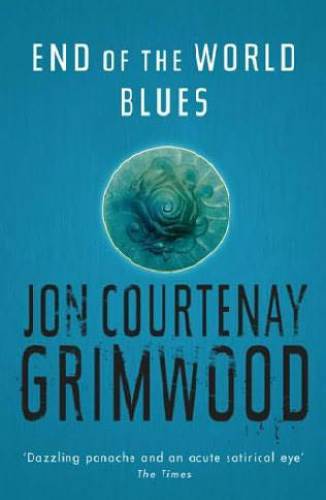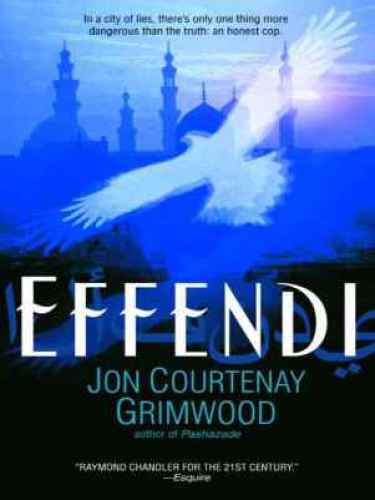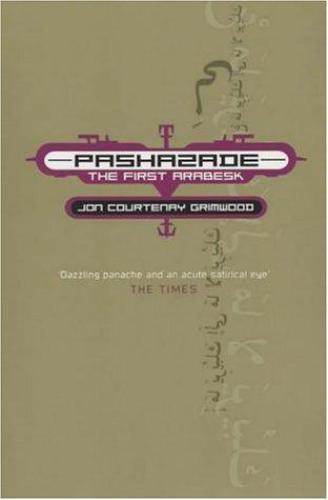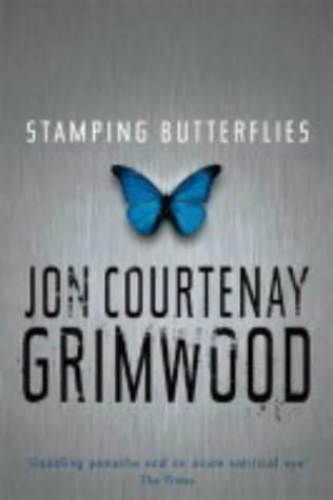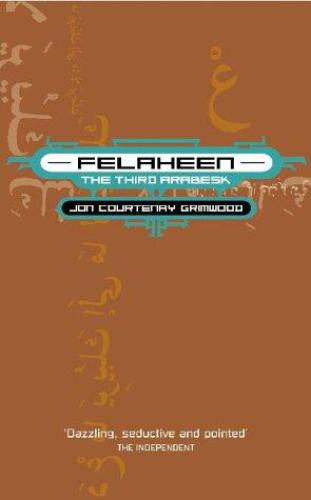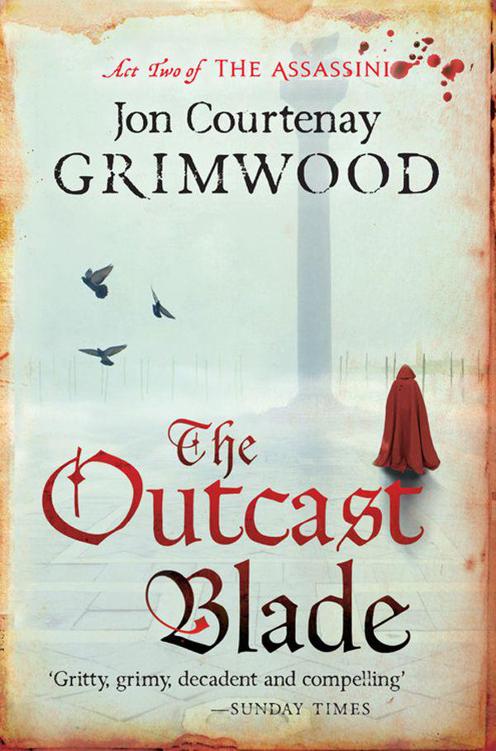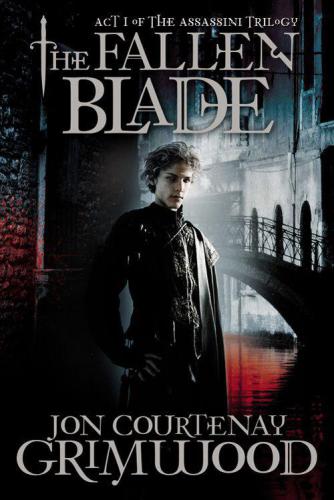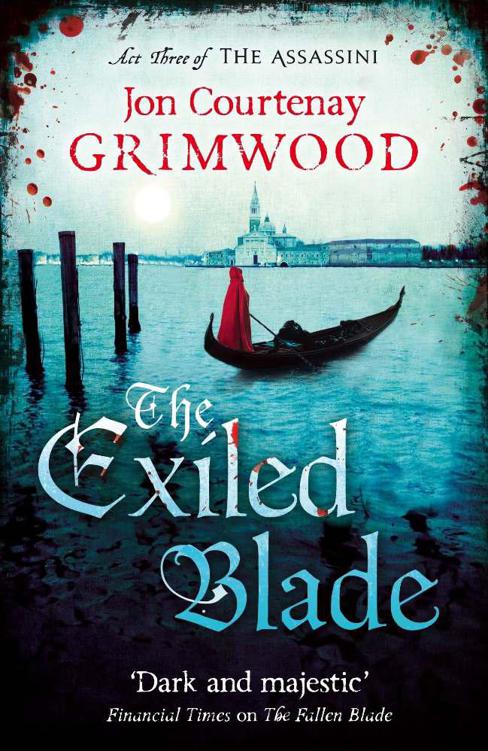oleebook.com
The Fallen Blade de Grimwood, Jon Courtenay
de Grimwood, Jon Courtenay - Género: English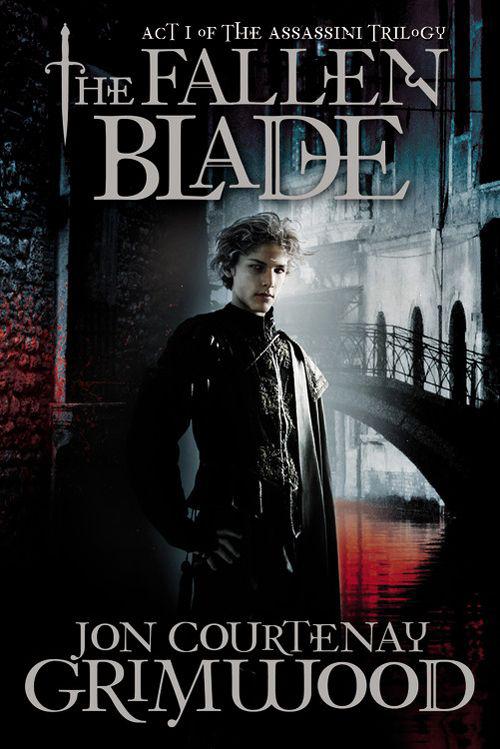
Sinopsis
From Booklist
Aside from Grimwood?s penchant for borrowing motifs from other genres, the author?s previous novels, including his acclaimed End of the World Blues (2007), mostly bear the imprint of sf. Yet here Grimwood confidently steps into fantasy territory in this first volume of an ambitious trilogy featuring an alternate renaissance Venice populated by corrupt monarchs, a secret army of assassins, and a bewitching side cast of werewolves and vampires. This version of early-fifteenth-century Venice is ruled by the descendants of Marco Polo, specifically Alonzo, the uncle of the bona fide but incapacitated Duke, who rules with Machiavellian intrigue in the face of his Byzantine and Ottoman enemies. After Alonzo?s scheme to marry off the Duke?s cousin Giulietta leads to her kidnapping, Alonzo sends his lead assassin, Atilo, on her trail. When Atilo fortuitously crosses paths with a young vampire, Tycho, he quickly recruits the boy as a very difficult but useful apprentice. Grimwood?s well-seasoned skill with storytelling and dialogue makes this opening installment of the series both delightfully colorful and compellingly readable. --Carl Hays
Review
'Sharp as a stiletto, dark and dazzling as a masquerade. Grimwood's Venice is totally compelling' Mike Carey
Descargar
Descargar The Fallen Blade ePub GratisLibros Recomendados - Relacionados
Reseñas Varias sobre este libro
DNF after ~50 pages. Every single female character's introduction included a description of her breasts, sometimes more than once, sometimes in the same sentence, e.g. "She was full-breasted, plump, and buxom."
BUT WHAT WERE HER BOOBIES LIKE THO.
-_-
I finally gave up where a woman was described as "just a slit."
Hey Publishers! Big thanks for giving this guy so many book deals. JK, fuck you forever.17 s Jacob Overmark206 9
Historic Fantasy can be a fun experience, it presents the possibility to set up a lot of what-ifs and build your story on any chosen premise, even the unly ones.
14th-16th century Venice surely has a lot of potential and there has been no shortage of speculation about what really took place in the Doge Palace, in the Iron Chambers and beyond.
The political intrigue is plausible, and we know for certain the disappearance of rivals or
used-to-be allies was the order of the day but
Now enters a flock of werewolves and a very singular vampire and we are moving from the unly premises into the realms of the unbelievable.
If you enjoy the occasional suck me dry vampire sex in a semi historic setting, you may enjoy the book, once you get some 50 pages into it, it has some drive to keep you up.
If you think vampires suck, find another book about Venice´s history, there are a lot around.
It killed some hours for me, hours that I will not get back, in this life or another, and for the effort of writing and probably Googling a lot about Venice, I will generously administer 2 stars.contemporary-international read-owned reviewed13 s Tamara262 77 Read
I can tolerate constant, graphic sexualized violence if it has some point. I might also let it pass if it rounded out an actual good novel. Theres nothing here under the rapes and the murders and the excrement. Characters are flat, plot is boring and incomprehensible, writing bland.action adventure alt-history ...more11 s Mangrii970 304
3,75 / 5
Nos situamos en una Venecia del siglo XV gobernada por dos regentes en la sombra de un duque incapaz, su madre Alex y su estratega tío Alonzo, ambos enfrentados en una guerra secreta entre sí. El gobierno posee una fuerza secreta, los Assasini, liderados por el veterano Atilo, que lleva tiempo en busca y captura de un heredero para su posición, y tras haber visto a un extraño muchacho que se mueve a una velocidad endiablada, cree que finalmente ha encontrado a alguien digno de ser su aprendiz.
Novela que mezcla historia y fantasía para ofrecer un entretenimiento bastante interesante, con un ritmo endiablado, que hacer devorar sus páginas, con personajes muy interesantes y con una ambientación de lo más atractiva ya de por si. El estilo narrativo de la obra resulta bastante confuso en muchas ocasiones, parco en descripciones, con unos diálogos un tanto confusos y crípticos en muchas ocasiones, además de una transición entre escenas bastante mediocre, donde es fácil perderse en los primeros compases.
Todo ello se ve compensado con la ambientación y la historia que narra. Ambientada en una Venecia previa al renacimiento italiano cerca del siglo XV, una ciudad en donde las violaciones, castigos violentos o los asesinatos están a la orden del día. Un lugar lleno de conspiraciones palaciegas, donde las maquinaciones a grande o pequeña escala se llevan a cabo a diario. La escenografía esta cuidada al detalle, te puedes imaginar por las calles de Venecia en cualquier momento, y la inclusión de acontecimientos o detalles fidedignos hace que ayude a ello. Esto junto con algunos guiños más, nos aportan la nota histórica de la novela. En cuanto al elemento fantástico de la obra, queda ciertamente algo difuminado en la trama de la novela; aunque detalles como las habilidades de Tycho, los hombres lobo conocidos como Krieghund, la figura de una Stregoi con mucho que decir o la figura del doctor Cuervo, aportan estos momentos que la hacen diferente.
En cuanto a los personajes de la obra, cabe decir que todos están bien definidos, con un claro papel en la trama, y durante la narración nos situaremos en el punto de vista de muchos de ellos. La trama del libro no llega a cerrarse en ningún momento, es una especie de primer acto, donde no se darán todas las respuestas, ni lo problemas quedarán solucionados, moviéndonos el interés a una segunda parte.La espada maldita abre el primer volumen de la trilogía de los Assasini, donde se reescribe la historia de la aparición del primer vampiro en Europa de una forma muy entretenida y con una ambientación excepcional.fantasy9 s Katie.dorny1,040 627
Its truly disappointing and bittersweet when you realise your reading tastes have changed, sometimes it is better to leave your favourite books as a teenager in the past as they dont hold up years later.
This was a 3.5/3 star read for me.
Set in historical Venice, here alongside ruling Italian families there is also magic that freely roams.
Tycho arrives in Venice chained in the Cargo hold, we see the world through his eyes as he struggles to adapt to this world he has never seen before. He quickly gets embroiled in the power struggles of the ruling Milloini family.
Tycho is then discovered by Lord Atilo, the head of the Assassini: quickly noted for his supernatural talents he is forced into apprenticeship and signed as Atilos heir. From this point is when the character dynamics and battles come into play.
It was interesting as someone who enjoys reading historical fiction to read this book with magic interwoven in the story. However it didnt suck me in as deeply as the first time I read it years ago and that has disappointed me.
20188 s Emms563 29
DNF DNF DNF DNF DNF DNF
In short, ABSOLUTELY NOT!!
The subpar writing, the flat characters, the boring plot... but most egregious is the glaringly obvious disdain for women. Every female character is young, attractive, has a huge bosom, and is nothing more than a "slit". Add in the gratuitous defecating and disturbing focus on the sexual assault, torture, and murder of the aforementioned "slits".
The only people that I could see possibly enjoying this drivel are INCELS.
I wouldn't touch another book by this author even if I were paid to read it.
Gross Gross Grossdnf7 s Olethros2,665 490
-Buena idea, buena ambientación, gran localización para la trama y, luego, problemas narrativos que afean gran parte de las fortalezas del libro.-
Género. Narrativa fantástica.
Lo que nos cuenta. En el libro La espada maldita (publicación original: The Fallen Blade, 2011) y a comienzos del siglo XV, Venecia es un próspero enclave comercial y de negocios que está en el punto de mira de imperios y facciones mucho más poderosos que la rodean tanto por tierra como por mar. Algunas de esas amenazas son sobrenaturales y los Assassini, el brazo secreto y mortal del gobierno de la ciudad, ven sus filas diezmadas sin remisión. El descubrimiento de un potencial recluta para el grupo, un muchacho con habilidades también sobrenaturales, puede cambiar la balanza; pero en la ciudad también hay conflictos internos que pueden desestabilizarla. Primer libro de la saga Los Assassini.
¿Quiere saber más de este libro, sin spoilers? Visite:
http://librosdeolethros.blogspot.com/...6 s IanAuthor 3 books233
Final Rating: 3/10
You can read my full length review of this book at my Official Website . Below is an overview of my thoughts about it.
OVERVIEW
In theory, reading a book blind?not knowing the first thing about it?shouldnt lead to disappointment, as there are no expectations for the book to live up to. Nevertheless, The Fallen Blade proved to be a very disappointing read for me?which is a shame. The ingredients for a compelling tale are all there: the premise is great, and the opening chapters (combining elements of historical fiction, horror and urban fantasy) promise great things ahead. Sadly, this potential is never realised.
Not to labour the point, the books multiple failings stem entirely from poor execution. The world building is let down by an alternate history that isnt convincing, while the narrative becomes increasingly unfocussed as it progresses. As for the characterisation, none of the characters are developed enough to be genuinely compelling, and, truth be told, I despised the protagonist. While it may not be necessary for protagonists to be flawlessly virtuous saints, I simply cant root for a woman beater. Consequently, I spent most of the book wanting the hero to die.
All in all, this is a book that left me lamenting what might have been. As the first book of a trilogy it utterly failed to entice me to want to read book two, so chances are I wont.
Subscribe to my author Newsletter
Vist my Official Website and Personal Blog
Make tip jar donations via Ko-fi or PayPal
Follow me on social media:
Facebook | Last.fm | Pinterest | Tumblr | Twitteralternate-history fantasy historical-fantasy6 s Kris43121 52
This book made me angry. I was really hating it for a while.
The first 10 pages was amazing. I was glued to my seat and in ecstasy.
Then the pacing changed and it never got back to the way it was in the beginning.
The focus shifts from the main character and the action and for the next 150 pages gets into unnecessary details, This isn't a novel about the assassins, don't be fooled by the title. This novel spends majority of its time setting up illusive grandiose plot lines and that shift so many times that its easy to loose track of the happening. In a very short time a lot of characters are introduced and that also contributes to the general confusion. So i had a lot of "who the h** is that again??" moments. I wanted a novel about assassins! After the first couple of pages i got something so mind numbing boring that i was left angry, because the start was so fantastic. I wanted to read about Tycho and the assassins, not all this pointless blocks of text!
The pacing and the story does settle down a bit, but only after 50% of the book. A real shame. After that it gets better and interesting. Just not so interesting at the start....Then i finally started to enjoy it again.
Another thing that annoyed me is all those twists and turns in the story line that after a time seemed to contradict it self. the book doesn't know where it wants to go.
And yet another thing that got me is the constant mentions of some form of defecating. Almost every other page somebody is either pissing of shitting... Come on, dude! Gritty realism does not equal the amount of times piss of shit is mentioned!! Its trying too hard in cheap ways.alternate-history dark-fantasy historical-fiction ...more5 s Gary355 5
Well this was a switch in periods and style for J CG and he's pulled it off! I love all his other books and most are set in modern-ish times but this takes us to Venice of the 15th century and there's a vampire too! Now, I'm a sucker for historical settings especially when realised as well as Mr CG has managed here and he's brought his usual prose aplomb to bear with a great cast of characters. It's the first in a series and I'm salivating already. Highly recommended.4 s Alix Taylor72 50
Venice, 1407. The city is at the height of its powers. In theory, Duke Marco commands, but Marco is a simpleton so his aunt and uncle rule in his stead. They seem all powerful, yet live in fear of assassins better than their own. On the night their world changes, Marco's young cousin prays in the family chapel for deliverance from a forced marriage. It is her misfortune to be alone when Mamluk pirates break in to abduct her - an act that will ultimately trigger war. Elsewhere Atilo, the Duke's chief assassin, cuts a man's throat. Hearing a noise, he turns back to find a boy drinking from the victim's wound. The speed with which the angel-faced boy dodges his dagger and scales a wall stuns Atilo. He knows then he must hunt him. Not to kill him, but because he's finally found what he thought was impossible - someone fit to be his apprentice.
I had a HUGE problem with this book which is probably why it was so hard to finish. There was a great start to the story, it had some really cool elements, but the entire book was about this mysterious clouded shrouded organization and even the parts of the organization and the character elements whose origins could have been or should have been explained, the werewolves, the pseudo vampires, the witches, their origins aren't explained AT all. Its unnecessarily mysterious and convoluted. Instead of the book being about the story, I'm trying to figure out the origins of these fantasy elements and characters, and its, there's just no explanation about any of it and its so weird. The book picks up and its action packed, from the first scene when Lady Giulietta is running away from an arranged marriage, and when her protectors end up getting slaughtered, the battle is HUGE and the action enormous.
The book is plot centric, the characters are not strong, but they are cemented by the authors throwing them into insane plot circumstances that made them into real characters. There were some disappointing author decisions, for example not to provide the mental commentary for Lady Desdaio, not to give any information about Lady Giulietta or Prince Leopold's 3 months together, which would have been amazing to see, he doesn't talk about the ridiculously cool hinted at assasin training, the stuff that makes really good Sci-fi fantasy books good this book just leaves out. Its the most ridiculous thing.
On the plus side, the descriptions of an alternate historied Venice in the 1400's, with fantasy and super cool sci-fi elements, the characters, as they were, were vivid, and intensely interesting, but the choiced that Grimwood made in what he explained, what he showed, took me right out of the story every time. By trying to hide so much he ended up hiding too much.
Cover Art: A
Plot: B+
Writing: C
Characters: B
Overall Rating: B3 s Dishonor8 3
I finished The Fallen Blade a few weeks ago, and it breaks my heart to say that I didn't it. On one hand, I didn't actively dis it either, but it never formed a seamless whole for me.
Maybe I've fallen out of love with fantasy, and it's taken an otherwise well-written and well-conceptualized book to make me realize it. The Fallen Blade follows a number of threads in a modified historical Venice, where the dukes are descendants of Marco Polo, and assassins and alchemists have free rein. With an incapable duke, the city is unstable and prey to all sorts of paranormal creatures and political machinations. Atilo, the aging head of the weakened Assassini finds Tycho, a pale boy who has memories of a destroyed Viking settlement and drinks blood. Atilo promptly makes Tycho his apprentice at the behest of his lover, Duchess Alexa, the reigning duke's mother. She in turn fights against the influence of her brother-in-law, Alonzo, who controls the Guard and the alchemist Hightown Crow. Then, there's Giulietta, cousin to the duke and pawn of Alonzo and Alexa--with blood that apparently attracts Tycho too.
The ideas are exciting and innovative, the writing tight and usually non-repetitive. Yet, perhaps because it's the first book in a series, The Fallen Blade felt somewhat stagnant to me. I never understood character motivations, the subplots were often not clearly resolved within this book, and the politics weren't particularly lively. One subplot in particular, involving Atilo's lady-love, Desdaio, was obviously an homage to Othello, but it didn't add much to the story. I don't know whether it's Grimwood's failing or mine, but the book didn't touch me or captivate me, and with such a stellar premise, that's what really disappoints me the most. fantasy historical not-particularly-fond-of3 s Jason1,179 265
3 Stars
First off, I love the writing of Jon Courtney Grimwood. He is an exceptional author. This book is no exception, it is well written, detailed, and atmospheric. This book is a fantastic time piece and it really brings to life the 14th century.
I am not sure why I lost interest at the halfway mark, but I did. I just could not keep focused on the story from that point on and frequently found myself lost to as what I just read. I should have stopped and come back to this rather than push on.
That being said, this is an Urban Fantasy done right. No cheesy high school love interests in this book. I loved parts of this book just not the whole.e-books read-20143 s Stefan409 167
The Fallen Blade is set in an alternate version of early 15th century Venice, ruled by the Milioni family, who are descendants of Marco Polo. Jon Courtenay Grimwood offers a vividly realized fantasy setting with this not quite historically accurate but still surprisingly realistic version of la Serenissima, the Serene Republic of Venice. Youll get many authentic looks at what life in this amazing city-state must have been , from the perspectives of both the rich and the poor. As a matter of fact, readers who are unaware of the changes Grimwood has made to the actual history of Venice might mistake this for a historical novel with fantasy elements, rather than a combination of alternate history and dark fantasy. Regardless, the setting of The Fallen Blade is one of its real strengths.
Its unfortunate that Grimwood took this intriguing starting point and overloaded it with what seems enough material for at least another novel or two. Within the first few chapters, youll encounter a vampire, werewolves, assassins, competing gangs, a witch, a magician, a contested regency, a romantic rivalry, and thats not nearly all. Theres so much going on in the first 100 or so pages of this novel that it frankly becomes too cluttered and hectic to be really enjoyable.
Unwrapping a few of the key elements: the titular Duke of the city is Marco IV, but since he is, as the saying goes, several sandwiches short of a picnic, his uncle Alonzo (brother of Marco III, the last Duke) is the official Regent, with his mother Alexa (the last Dukes widow) pulling at least as many strings both in the citys Council of Ten and behind the scenes. Lady Giulietta is the Dukes cousin and about to be shipped off to Cyprus for a politically expedient marriage she is entirely unhappy with. Lady Desdaio is one of the most desired women in Venice, being both very attractive and the daughter of one of the richest men in the city. Roderigo, the captain of the Dogana, is courting her, but wouldnt you know it, she falls for Atilo, a heathen Moor who also happens to be the leader of the Assassini, a group of assassins that function as the citys secret enforcers. Still with us so far? Good. Now add to this mix what appears to be a revenant vampire in the form of an impossibly gorgeous young man, who arrives in Venice as a captive with only the vaguest memories of his mysterious origins, and a group of werewolves (called krieghund) who seem to be agents of a competing government. When Lady Giulietta runs away and the krieghund attack her, Atilos assassini are decimated trying to protect her, leaving Venice without much of its secretive security forces...
Most of these items are introduced in the first 50 or so pages of The Fallen Blade, which occasionally makes it feel a particularly violent episode of something The Bold and the Beautiful with added vampires and werewolves. On the one hand, there are the beautifully authentic descriptions of life in 15th century Venice, but on the other, it feels as if you simply cant walk across the street in this city without encountering half a dozen street battles, intrigues, crimes, supernatural creatures and romantic rivalries. The story gallops along at an impossibly rapid pace, divided into many short chapters and jumping from character to character quickly. This is mirrored in the novels prose: Jon Courtenay Grimwood frequently uses periods instead of commas, turning sentence fragments into separate sentences, giving some paragraphs a staccato, stop-start rhythm.
If theres just too much packed in the first third or so of The Fallen Blade, the pace fortunately slackens somewhat later on. Once youre able to catch your breath, the network of intrigues and rivalries begins to take shape and becomes much more enjoyable to follow. Grimwood also gradually reveals more about his characters past, which leads to some very intriguing questions that will hopefully be dealt with in future volumes of the ASSASSINI. Most interesting of course is Tycho, the revenant vampire with vague flashback memories of his past, but both Atilo, the old leader of the diminished assassini, and Alexa, the mysterious, hidden power player in the republics politics, are fascinating characters.
The final parts of The Fallen Blade revert back to the hectic pace of the beginning, shifting some of the action out of Venice with an unly, desperate sea battle and an unfortunate deus ex machina ending, but there are also hints at hidden depths as Tychos past becomes more defined. The background story of this fantasy world is intriguing (and clearly covers more than just Venice) but its occasionally hard to spot it between everything else thats thrown at you. Be sure to check out the Extras section in the back of the book for some interesting thoughts from the author about the ASSASSINIs world.
Theres a lot more going on in The Fallen Blade than Ive even hinted at here. For example, you dont think wed have an impossibly attractive, almost otherworldly young male vampire without at least some romantic tension, right? There are also some instances of shockingly gory violence and torture that may take more sensitive readers by surprise. The novel combines moments of genuine excitement and an intriguing pseudo-historical setting with many moments where it feels theres just too much happening at the same time. My experience with The Fallen Blade frequently swung from bewilderment to enjoyment and back, but one things for sure: its never boring.
In fantasy nowadays, assassins are hot, and vampires are even hotter, so as surely as the night doth follow the day, a vampire assassin had to be on the way. Jon Courtenay Grimwood delivers with The Fallen Blade, book one in a series that promises to be a wild, improbable adventure in Renaissance Europe and possibly beyond. The novel is far from perfect and occasionally strays into full-on pulp territory, but theres so much happening that its hard not to be entertained.
(This review was also published at www.fantasyliterature.com on 2/11/2010.)advance-reading-copy ebook fantasy2 s Magpyd1 review
Having read the Arabesk Trilogy last year I was very excited to discover Jon Courtenay Grimwood was making his first foray in (alt-historical) fantasy.
At times I can sympathise with other readers' issues with Grimwood's style; it isn't easy at times. However, his style does brilliant articulate the inward struggles of his characters as they try to discover who (and what) they are and who they can become. The lack of definite answers, I feel, is the greatest strength of the novel. Medieval Europe was a time of great uncertainty for its peoples, with who-knows-what lurking in the darkness of the forests, oceans and alleyways, and as readers we know almost as little as The Fallen Blade's protagonists. Even significant players such as the controlling Duchess Alexa are shown to have gaps in their knowledge, and we too can wonder at what Grimwood chooses to leave out only to reveal in passing later.
Tycho and Atilo are not (and are not meant to be) sympathetic characters, but they are strong and do what they decree is right (but not necessarily just). The heart of the novel lies with its two paragons of female virtue, Desdaio and Guiletta. However, neither woman is perfect and both suffer the consequences of those imperfections in this brutal and uncaring world. Guiletta is a spoilt Millioni princess who must learn to adapt to a life away from the garish palaces of her rank; Desdaio chooses to abandon those palaces in for the love of the Mamluk (Turkish) Atilo but discovers betrothed life is not what she thought it would be. Both women fight for duty and their reputations, though it remains to be seen where this will take them. The only character I was let wanting by was the seductive, cold, calculating and utterly mysterious Alexa, I hope that her past, her aims and her knowledge of Tycho and his kind will be explored more in the next book.
As an English major I found the parallels to Shakespeare's Othello startling at times and wholly satisfying at others. The Iago character, in Othello, is not particularly well justified, but that, I suspect, is the point. The book ends at the beginning of Act 2, and all I can think how Grimwood will rework the rest of the play in this dark and deadly vision of Venice--and how much and how little I am looking forward to this.2 s Danielle18 1 follower
I always finish a book - but not this one. For about 10 pages or so, it starts off fairly interesting... then it becomes so utterly garbling that I couldn't tell you who is currently the POV. On that point, I never really see the value in establishing multiple viewpoints between characters that are constantly in the same setting. The Fallen Blade falls deep into this, presumably the intention is to gather another character's opinion something, a quick way to open up the world. For me, this became a bit rambling and only served to bloat the narrative.
I felt this to be another fantasy wherein the author was entranced with their own writing, having read other greater, fantasy novels (i.e. The Lies of Locke Lamora). I found it difficult to ascertain the overall "goal" of the plot, or even that of the character - could be that I didn't care.
1/5 stars. 2 s Alison Smith843 20
A historical fantasy, in 15th century Venice. History, with a dash of the paranormal tossed in just to make things REALLY interesting. A dark, page turner. I needed something un-serious, un-literary, maybe a bit trashy. I got it, big time! Its compelling, its grim, but you keep turning the pages. If blood and guts, flaying, rape, and squalor are not your thing, avoid this book. Sword and sorcery fans will love it. I must admit, I wouldn't mind reading Books 2 & 3 in the trilogy . I, too, have my dark side ...
2 s Becky2
I'd to give this another star as I quite enjoyed the story and the new take on the vampire legend, but the rather choppy writing style caused me to have to re-read many a sentence. Here's hoping the second book is better written!2 s SarahAuthor 25 books483
Please read my review of the full trilogy here:
http://www.bookwormblues.net/2013/09/...arc-or-review-copy dark fantasy ...more2 s Babel2,181 189
Oscura, sensual, macabra y fantástica. He adorado cada página.challenge mi-biblioteca2 s Fantasy Literature3,226 164
Reviewed by Robert, Stefan, Marion:
http://www.fantasyliterature.com/fant...2 s Bücherfresserin342 91
"Gelungenes Venedig mit einer Mischung aus viel zu vielen Charakteren und vorhersehbarer Spannung."
Inhalt:
Die Geschichte spielt in Venedig im frühen 15. Jahrhundert. Zwischen politischen Machtkämpfen erwartet Atilo allerhand Arbeit. Als Anführer der Assasinen arbeitet er meist im Hintergrund, bekommt den Auftrag gezielt zu töten. Doch er wird alt, sucht einen passenden Nachfolger. Da trifft Tycho ein, durch Venedig gejagt und als Sklave gefangen genommen bekommt in Atilo unter die Fittiche. Schnell wird klar, dass Tycho geheimnisvolle Fähigkeiten hat. Plötzlich gesellen sich zu den typischen Machtkämpfen und politischen Komplotten auch noch magische Wesen, Hexe, Werwölfe und mehr. Doch wie wird Tycho handeln? Wird er ewig ein Werkzeug des Fürsten bleiben?
Meinung:
Silberklinge ist der Beginn der Die Schatten von Venedig Trilogie. Der Autor platziert eine Action-Fantasy Geschichte im historischen Venedig im frühen 15. Jahrhundert. Silberklingen ist somit eine Art historischer Fantasyroman, der vor allem durch viel Action, Kampf und Brutalität auf sich aufmerksam macht.
In Silberklinge gibt es eine Vielzahl an Charakteren und dadurch ebenso viele Handlungsstränge. Zu Beginn erfährt man vieles aus der Sicht Atilos, der Anführer der Assasinen ist und dringend einen Nachfolger sucht. Seine Aufgabe ist es im Hintergrund unauffällig zu töten. Morde zu begehen, um seinen Fürsten zu dienen.Dazu gesellt sich recht schnell Giulietta, eine junge Frau der herrschenden Familie Millioni. Sie wird als Braut gebraucht, um Venedigs Verbindungen zu anderen Städten zu stärken. Es gibt natürlich noch allerhand weiterer Charaktere, die eine wichtige Rolle spielen. Die Masse ist hier sehr groß und es ist recht schwer sich als Leser einen Einstieg in diesen Namens Wirrwarr zu bahnen.
Der wichtigste Protagonist ist wahrscheinlich dann auch Tycho. Ein mysteriöser Mann, der plötzlich in Venedig auftaucht. Er wird gejagt, schlecht behandelt und schließlich zum Sklaven erklärt. Allerdings weiß er zu Beginn selbst nicht so recht, was er eigentlich ist. Er verträgt weder Tageslicht, noch Wasser und der Geruch von Blut weckt eine starke Gier nach mehr aus. Gerade dadurch wird Tycho für viele Charaktere in dem Roman spannend. Sein Aussehen ist verzaubernd, durch sein silbernes Haar fällt er zudem schnell auf. Obwohl Tycho teils sehr einfach wirkt, wechselt sein Charakter im Laufe der Geschichte immer wieder. Ich fand ihn dadurch allerdings noch weniger authentisch.
Dieses Bild zieht sich auch durch den ganzen Roman. Zu viele Charaktere, zu viele parallele Handlungsstränge, zu viele verwirrende Namen und politische Verbinungen oder Verfeindungen.
Allerdings erschafft der Autor ein authentisches Venedig. Es gibt ausgiebig Beschreibungen, die einem das Venedig des 15. Jahrhunderts näher bringen. Diese Passagen halten sich zudem in Grenzen und überschwemmen nicht das Buch, was ich wirklich gut finde.
Dennoch konnte mich Silberklinge nicht überzeugen. Der Roman war wirklich zäh und ich konnte mich im Verlauf der Geschichte immer weniger begeistern den Roman weiter zu lesen. Dies liegt an verschiedenen Punkten:
>Erstens ist der Roman vollgestopft mit unzähligen Charakteren. Jeder wird benannt und irgendwie wirken alle Charaktere flach. Es gibt keinen richtigen Unterschied zwischen Protagonisten und Nebencharakteren. Alles wird auf rund 500 Seiten einfach zu mächtig und vor allem zu nervig.
>Zweitens ist Silberklinge zwar ein historischer Gaumenschmaus, aber die Geschichte ist einfach nicht rund. Der Spannungsbogen hat bei mir überhaupt nicht gefunkt und auch der Rest der Handlung ist relativ ähnlich. Sklave, Jagd, Tod, politischer Komplott usw. Wirklich spannende Wendungen gab es nicht, sondern eher viele wahllose Actionszenen und brutale Kämpfe oder Ermordungen.
>Drittens passt mir der magische Anteil überhaupt nicht. Es passt irgendwie nicht. In Silberklinge geht es vor allem um das historische Venedig und plötzlich tauchen Hexen und Werwölfe auf. Natürlich alles nur am Rande, denn diese Wesen sind der unsichtbare Feind Venedigs. Das ganze wirkte beim Lesen alles andere als stimmig, ebenso wie es Tycho war. Es wird auf keinen der 512 Seiten genau und präzise gesagt, was Tycho nun eigentlich ist. Durch seine seltsamen Fähigkeiten wirkt er wie ein typischer 0815 Vampir. Aber er kann sich an kaum etwas erinnern. Er benutzt seine Fähigkeiten selten und bleibt daher blass. Verwirrend ist es dann auch, wenn plötzlich von Nephilim gesprochen wird. Es wäre wirklich wichtig für die Geschichte gewesen, den seltsamen Fantasy Anteil in der Geschichte dem Leser näher zubringen.
Insgesamt ist Silberklinge ein Start in eine historische Fantasy Trilogie, die sich vor allem an Leser richtet, die das brutale Leben von damals faszinierend finden. Die Geschichte hat viele kämpferische Szenen, politische Machtkämpfe, sowie ein schlechtes Frauenbild. Genau damit konnte ich leider nur recht wenig anfangen, mir fehlte Inhalt, spannende Wendungen und interessante Charaktere.
Außerdem erscheinen die Frauen wirklich als dermaßen schwach, dass es schon künstlich wirkt. Klar, zur damaligen Zeit hatten Frauen keine Rechte etc., aber im Hintergrund haben viele Frauen meist die Fäden gezogen, was in Silberklinge überhaupt nicht eingebaut wird. Es geht schlicht und ergreifend um kämpfende Männer, die dauernd irgendwen umlegen müssen.
Der Schreibstil ist sehr angenehm zu lesen. Als Leser kann man in ein altes Venedig eintauchen. Es gibt Charakterwechsel, sodass man aus der Sicht verschiedener Charaktere die Geschichte und das Leben in Venedig beobachten kann. Zudem kann man durch den flüssigen Stil die 512 Seiten auch relativ zügig lesen, wenn man denn die Geschichte als nicht zäh empfindet.
Das Cover ist mysteriös und weckt Interesse. Der Titel ist meiner Meinung nach nicht aussagekräftig genug, ebenso wie der Klappentext. So wie im Klappentext versprochen liest sich die Geschichte nämlich nicht. Ich hätte durch die geheimnisvolle Gestalt auf dem Cover zudem mehr Assasinen erwarten. Außerdem gibt es im Inneren einen Stammbaum wie Namenindex. Meiner Meinung nach zeugt das ebenfalls davon, dass es einfach viel zu viele gleich flache Charaktere gibt, denn ohne diese Übersicht blickt man nach 100 Seiten kaum noch durch.
Fazit:
Silberklinge ist ein historische Roman mit einen Schuss Fantasy. Allerdings konnte mich dieser Roman leider nicht überzeugen. Trotz einem tollen Setting und guten Beschreibungen des alten Venedigs, fehlen einfach spannende Wendungen und starke Charaktere. Silberklinge könnte jedoch interessant sein für Leser, die gerne viel Action, Brutalität und harte Männerkampfe lesen. Ich vergebe jedoch nur knappe 2 Sterne.bücher-tausch-liste read-in-20121 Jack Bottomley49 2
Pretty much every single woman is introduced with a comment on the size/shape of her breasts. These comments continue about the same women, chapters apart, even after I already know plenty about their nipples. I feel there must be more to the characters here than their chests, but it's an effort to find it. 2 stars because the plot wasn't complete garbage.1 hevs127 15
There is hope for the vampires in fiction after all!1 si ( ??? )417 28 Shelved as 'did-not-finish'
this has low ratings but im genuinely so fascinated by the premise i just need to know for myself lol2023-dnf fairies-die-when-this-gets-5-stars i-got-bored ...more1 Dee878 48
Meh.
Actually, this is an interesting book to try and talk about, because my emotional response when reading was "this is just lacking" but once I actually try and think about "how to fix it", I become puzzled as to why it doesn't work. It seems to have everything it should - a pretty tight story focused around a collection of interlocking characters with high stakes. Also vampires, werewolves, magick and swooning maidens.
Why doesn't it work?
For me, it's because I'm just not feeling it, and that's probably down to a couple of big factors about the way it's told. One: the story is tight, but the telling of it is all over the place. It jumps between narrators without balance (one guy's only used in the first third of the book, one guy only used in the middle third, the final third is almost exclusively from the "hero's" POV without break). It jumps around in time without giving you any clear indication until you get a couple of pages into the new chapter, and thus confusion abounds (not assisted by his drama-over-clarity style, especially in the meta-story patches). And Two: it talks a lot about the big emotions the characters are feeling - which drive their actions - but I rarely saw or felt the justification for them. This was especially bad for love, which all of the characters feel passionately for one or more of the other characters, usually not the one who feels that way about them - I had no idea what any of them were talking about, because there rarely seemed to be any basis for that love, and certainly few of them acted they genuinely cared about that person. (Particular extra-special face-pulling for Tycho and Giulietta, who meet for scant moments and are bound by love henceforth. Bleurgh.) In general, I just didn't care much for any of the characters (a little for Atilo; a little for Desdaio; both of these withered as the book progressed) and thus I just plain didn't care.
Anyway, when you have a vampire and a werewolf duelling with magical swords atop a Venetian tower and I'm BORED, you're doing something wrong.a-kind-of-magic grit ninjas-get-chicks ...more1 Julie DawsonAuthor 142 books54
I confess that The Fallen Blade is one of those books that left me rather conflicted. Atilo Il Mauros is head of the Assassini, the private enforcers of Venice's ruling family during the 15th century. While attempting to rescue the Duke's kidnapped cousin, he comes across Tycho, a young man with preternatural strength and inhuman powers. Where Tycho goes, bloodshed and death follow. But to the head of the deadly Assassini, this isn't necessarily a bad thing.
Grimwood excels at taking Venice and making it his own, seamlessly weaving the historical city with the supernatural aspects of his tale. His depiction of magic and the supernatural blends effortlessly into the greater political and social intrigues of the book, and comes across as a natural part of the setting.
Character development, however, is uneven. The two most interesting characters are Atilo and Tycho, and you will want to continue reading if for no other reason than to see what happens to them. But many of the other characters are either one dimensional or outright grating on the nerves. Giulietta has a nuisance of a personality, and one that leads the reader to hoping for her demise just so she will stop sullying the scene with her annoying demeanor. Alonzo is a Medici knock-off who apparently never realized that The Prince was a political satire and not an actual handbook.
But where I become conflicted is in the presentation of the plot. Grimwood does a superb job of crafting some of the most intense and exciting scenes I've read in recent fantasy works. But what he often lacks is subtlety. The political machinations at play throughout the book have all the subtlety of an angry bull. Much of the plotting is almost comical in its overtness, almost as if it is suppose to be a parody of 15th century Venetian politics. In the end, as a reader I decided to simply enjoy the ride and just follow the action, but some readers may be disappointed that the scheming lacks the clever insinuation one would expect considering the source material.
Reviewer Note: Publisher provided a review copy of the book. 1 Dawn1,299 73
What was I thinking, vampires are not my thing, at all. I quit at 20%. audiobook fantasy series-abandoned1 Liviu2,322 654
I was somewhat disappointed in this book in the sense that i expected a blow me away A++ novel based on prior experience with the author's novels (read all 10 so far) and the premise of this one - alt-history fantasy set in an Earth with some magic in the early 1400's Venice.
The book has a lot of goodies: extremely good atmosphere, you can really visualize and even "feel" the Venice of 1400;s so good are the descriptions; great vivid characters in Tycho, Atilo, Giuletta, Desdaio, Alexa and several others and some twists and turns that are excellent, while all the world building and differences from our world are very well inserted at crucial points.
But the novel's style is very fractured, full of narrative walls, the book just does not flow which surprised me a lot. It is very "jerky" and the plot does not hold scrutiny in some key parts that seem to happen only because the author wanted it so his selected set of surviving characters could get away from hopeless situations which of course kill his "sacrifice" characters... No rhyme or reason beyond authorial fiat and that was the second major negative
I would give it a B for the many goodies and while I am interested in the next book, it won't be the asap as this one was. I hope the author will raise the quality of the prose and plotting to the level of his early novels since the series has high potential.2011_release_read genre-fantasy read_20101 NigelAuthor 12 books61
Autor del comentario:
=================================
